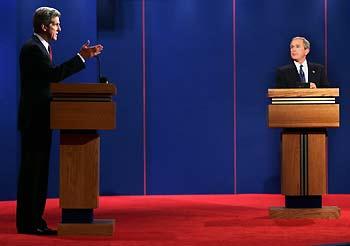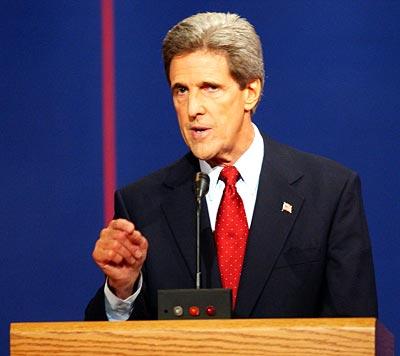

John Kerry was wrong.
BEIJING (AP) -- North Korea pledged to drop its nuclear weapons development and rejoin international arms treaties in a unanimous agreement Monday at six- party arms talks. The agreement was the first-ever joint statement after more than two years of negotiations.
The North "promised to drop all nuclear weapons and current nuclear programs and to get back to the (Nuclear) Nonproliferation Treaty as soon as possible and to accept inspections" by the International Atomic Energy Agency, according to the agreement by the six countries at the talks.
"All six parties emphasized that to realize the inspectable denuclearization of the Korean Peninsula is the target of the six- party talks," the statement said.
The North and United States also pledged in the agreement to respect each other's sovereignty and right to peaceful coexistence.
"The United States affirmed that is has no nuclear weapons on the Korean Peninsula and has no intention to attack or invade (North Korea) with nuclear or conventional weapons," according to the statement, assurances echoed by South Korea.
..."This is the most important result since the six-party talks started more than two years ago," said Wu Dawei, China's vice foreign minister.
Will John Kerry issue a statement commending the dramatic progress made in the talks?
No.
During the first Bush-Kerry Presidential Debate on September 30, 2004, Kerry blasted the Bush administration's handling of the North Korean nuclear threat and claimed the U.S. had no credibility on the international stage.
Transcript
While discussing the concept of preemptive war, Kerry said:
No president, through all of American history, has ever ceded, and nor would I, the right to preempt in any way necessary to protect the United States of America.
But if and when you do it, Jim, you have to do it in a way that passes the test, that passes the global test where your countrymen, your people understand fully why you're doing what you're doing and you can prove to the world that you did it for legitimate reasons.
...How many leaders in the world today would respond to us, as a result of what we've done, in that way? So what is at test here is the credibility of the United States of America and how we lead the world. And Iran and Iraq are now more dangerous -- Iran and North Korea are now more dangerous.
Throughout the 2004 campaign, Kerry insisted that the policies of Bush the Cowboy were failing the U.S. Supposedly, Bush was responsible for not properly handling North Korea and nuclear proliferation.
In the following exchange, Bush clearly explains how North Korea was violating the agreement it made with the Clinton adminstration. Bush states his strategy for dealing with North Korea, given its failure to abide by the terms of that agreement. Meanwhile, Kerry spouts off about the administration's "incompetence."
LEHRER: New question, Mr. President. Do you believe that diplomacy and sanctions can resolve the nuclear problems with North Korea and Iran? Take them in any order you would like.
BUSH: North Korea, first, I do. Let me say -- I certainly hope so. Before I was sworn in, the policy of this government was to have bilateral negotiations with North Korea.
And we signed an agreement with North Korea that my administration found out that was not being honored by the North Koreans.
And so I decided that a better way to approach the issue was to get other nations involved, just besides us. And in Crawford, Texas, Jiang Zemin and I agreed that the nuclear-weapons-free peninsula, Korean Peninsula, was in his interest and our interest and the world's interest.
And so we began a new dialogue with North Korea, one that included not only the United States, but now China. And China's a got a lot of influence over North Korea, some ways more than we do.
As well, we included South Korea, Japan and Russia. So now there are five voices speaking to Kim Jong Il, not just one.
And so if Kim Jong Il decides again to not honor an agreement, he's not only doing injustice to America, he'd be doing injustice to China, as well.
And I think this will work. It's not going to work if we open up a dialogue with Kim Jong Il. He wants to unravel the six- party talks, or the five-nation coalition that's sending him a clear message.
KERRY: With respect to North Korea, the real story: We had inspectors and television cameras in the nuclear reactor in North Korea. Secretary Bill Perry negotiated that under President Clinton. And we knew where the fuel rods were. And we knew the limits on their nuclear power.
Colin Powell, our secretary of state, announced one day that we were going to continue the dialog of working with the North Koreans. The president reversed it publicly while the president of South Korea was here.
And the president of South Korea went back to South Korea bewildered and embarrassed because it went against his policy. And for two years, this administration didn't talk at all to North Korea.
While they didn't talk at all, the fuel rods came out, the inspectors were kicked out, the television cameras were kicked out. And today, there are four to seven nuclear weapons in the hands of North Korea.
That happened on this president's watch.
Now, that, I think, is one of the most serious, sort of, reversals or mixed messages that you could possibly send.
LEHRER: I want to make sure -- yes, sir -- but in this one minute, I want to make sure that we understand -- the people watching understand the differences between the two of you on this.
You want to continue the multinational talks, correct?
BUSH: Right.
LEHRER: And you're willing to do it...
KERRY: Both. I want bilateral talks which put all of the issues, from the armistice of 1952, the economic issues, the human rights issues, the artillery disposal issues, the DMZ issues and the nuclear issues on the table.
LEHRER: And you're opposed to that. Right?
BUSH: The minute we have bilateral talks, the six-party talks will unwind. That's exactly what Kim Jong Il wants. And by the way, the breach on the agreement was not through plutonium. The breach on the agreement is highly enriched uranium. That's what we caught him doing. That's where he was breaking the agreement.
It is far too early to tell whether North Korea will live up to its vow to drop its nuclear programs. Nonetheless, the Monday announcement that North Korea has agreed to halt its nuclear weapons development and will accept inspections by the International Atomic Energy Agency is a step in the right direction.
As Wu Dawei, China's vice foreign minister, said, "This is the most important result since the six-party talks started more than two years ago."
Obviously, the talks have produced positive results in spite of Kerry's dire warnings that there was a void of leadership under Bush and the U.S. would not be taken seriouly on matters of international concern.
Again, when it comes to North Korea and nukes, words aren't enough. We need to verify its claims of denuclearization. Personally, I'm wary of North Korea's willingness to make good on its promises.
That aside, Kerry was wrong about the effectiveness of the Bush administration's approach regarding the North Korean problem.
Six-party talks were productive.
Kerry was quick to criticize what "happened on this president's watch."
I don't expect him to have the integrity to give credit to Bush for the progress that has been made "on his watch."
I also don't expect Kerry to ever be the leader of the Free World.
No comments:
Post a Comment